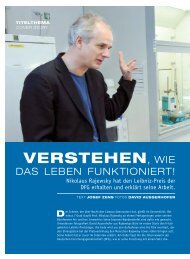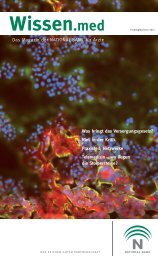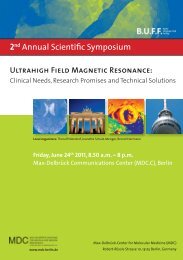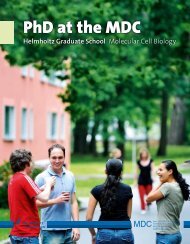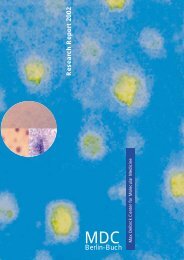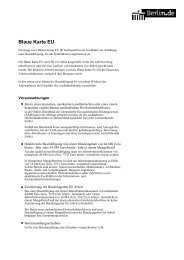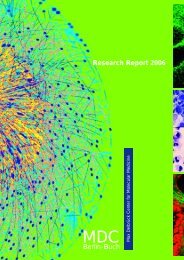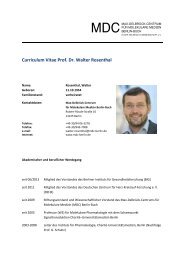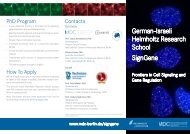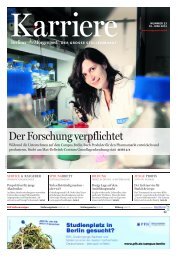Research Report 2010 - MDC
Research Report 2010 - MDC
Research Report 2010 - MDC
Create successful ePaper yourself
Turn your PDF publications into a flip-book with our unique Google optimized e-Paper software.
2009Physician Professor Walter Rosenthal has been appointedas Scientific Director of the <strong>MDC</strong>. The former director ofthe Leibniz-Institut für Molekulare Pharmakologie (FMP)succeeds cancer researcher Professor Walter Birchmeierwho has served as the <strong>MDC</strong> Scientific Director for thepast five years and who now focuses again to his <strong>MDC</strong>research group.At their annual meeting in March, 2009 the members ofthe German Society for Chrystallography (DGK) electedProfessor Udo Heinemann to be Chairman of the Board.The term of office is three years. Professor Heinemannsucceeds Professor Wolfgang Neumann from HumboldtUniversity Berlin. The DGK has more than 1000 members.In January, Dr. Wei Chen, head of the research groupApplied Bioinformatics at the Max Planck Institute (MPI)of Molecular Genetics, Berlin, has been appointed to<strong>MDC</strong>´s Berlin Institute for Medical Systems Biology(BIMSB). Dr. Chen heads the technology platform“Genomics”, which uses state-of-the-art parallelsequencing technologies. They are considerably fasterand more cost-effective than conventional sequencingequipment. With the new generation of sequencers, Dr.Chen has established a number of different methods toinvestigate the function of genesDr. Markus Landthaler from Rockefeller University in NewYork, USA, has been appointed to the Berlin Institute forMedical Systems Biology (BIMBS). He began his work asjunior research group leader at the <strong>MDC</strong> at the beginningof March. His research area is concerned with microRNAsand RNA binding proteins, which together are instrumentalin regulating protein synthesis in the cells. Thisregulation takes place in complex networks, the understandingof which can explain the mechanisms of diseasepathogenesis and development. For this purpose, Dr.Landthaler has established special RNA-protein crosslinkingexperiments which he combines with the newtechnologies in the BIMSB, deep sequencing and massspectrometry, to elucidate a system-wide under-standingof RNA-based and protein-based post-transcriptionalregulation mechanisms.Dr. Christoph Dieterich of the Max Planck Institute (MPI)of Developmental Biology, Tübingen, came to the BerlinInstitute for Medical Systems Biology (BIMSB) of the<strong>MDC</strong> in April 2009. He heads the technology platform2009Der Pharmakologe Prof. Walter Rosenthal und bisherigeDirektor des Leibniz-Instituts für Molekulare Pharmakologie(FMP) ist seit Januar 2009 neuer wissenschaftlicherVorstand des <strong>MDC</strong>. Er ist Nachfolger von KrebsforscherProf. Walter Birchmeier, der dieses Amt fünf Jahre innehatte und sich wieder verstärkt seiner Forschungsgruppeam <strong>MDC</strong> widmet.Auf ihrer Jahrestagung haben die Mitglieder der DeutschenGesellschaft für Kristallographie (DGK) am 10. März2009 Prof. Udo Heinemann zum neuen Vorstandsvorsitzendengewählt. Die Amtsperiode beträgt drei Jahre. Prof.Heinemann löst Prof. Wolfgang Neumann von der Humboldt-UniversitätBerlin ab. Die DGK hat mehr als 1 000Mitglieder.Dr. Wei Chen, Leiter der Forschungsgruppe AngewandteBioinformatik am Max-Planck-Institut (MPI) für MolekulareGenetik, Berlin, ist im Januar 2009 an das Berlin Institutefor Medical Systems Biology (BIMSB) des <strong>MDC</strong> gekommen.Dort leitet er die wissenschaftliche Technologieplattform„Genomics“, die modernste, parallel arbeitendeSequenziertechnologien einsetzt, die erheblich schnellerund kostengünstiger sind als herkömmliche Sequenzierapparate.Mit den neuen Maschinen hat Dr. Chen im BIMSBeine Reihe verschiedener Ansätze für die Erforschung derFunktion von Genen eingerichtet.Im März 2009 hat der Molekularbiologe Dr. Markus Landthalervon der Rockefeller Universität in New York, USA,seine Arbeit als Nachwuchsgruppenleiter am Berlin Institutefor Medical Systems Biology (BIMSB) des <strong>MDC</strong> aufgenommen.Arbeitsgebiet von Dr. Landthaler sind kleineRibonukleinsäuren (microRNAs) sowie RNA-bindende Proteine,die zusammen maßgeblich die Proteinsynthese inZellen regulieren. Diese Regulation spielt sich in komplexenNetzwerken ab, deren Verständnis auch die Mechanismender Entwicklung und Krankheitsentstehung erklären. Erhat hierzu spezielle RNA-Protein-Kreuzvernetzungsexperimenteetabliert, die er mit den neuen Technologien imBIMSB, der Tiefensequenzierung und der Massenspektrometrie,kombiniert. Damit will er ein systemweites Verständnisvon RNA- und Protein-basierten posttranskriptionalenRegulationsmechanismen erarbeiten.Dr. Christoph Dieterich vom Max-Planck-Institut (MPI) fürEntwicklungsbiologie, Tübingen, ist im April 2009 an dasBerlin Institute for Medical Systems Biology (BIMSB) desAcademics 237



